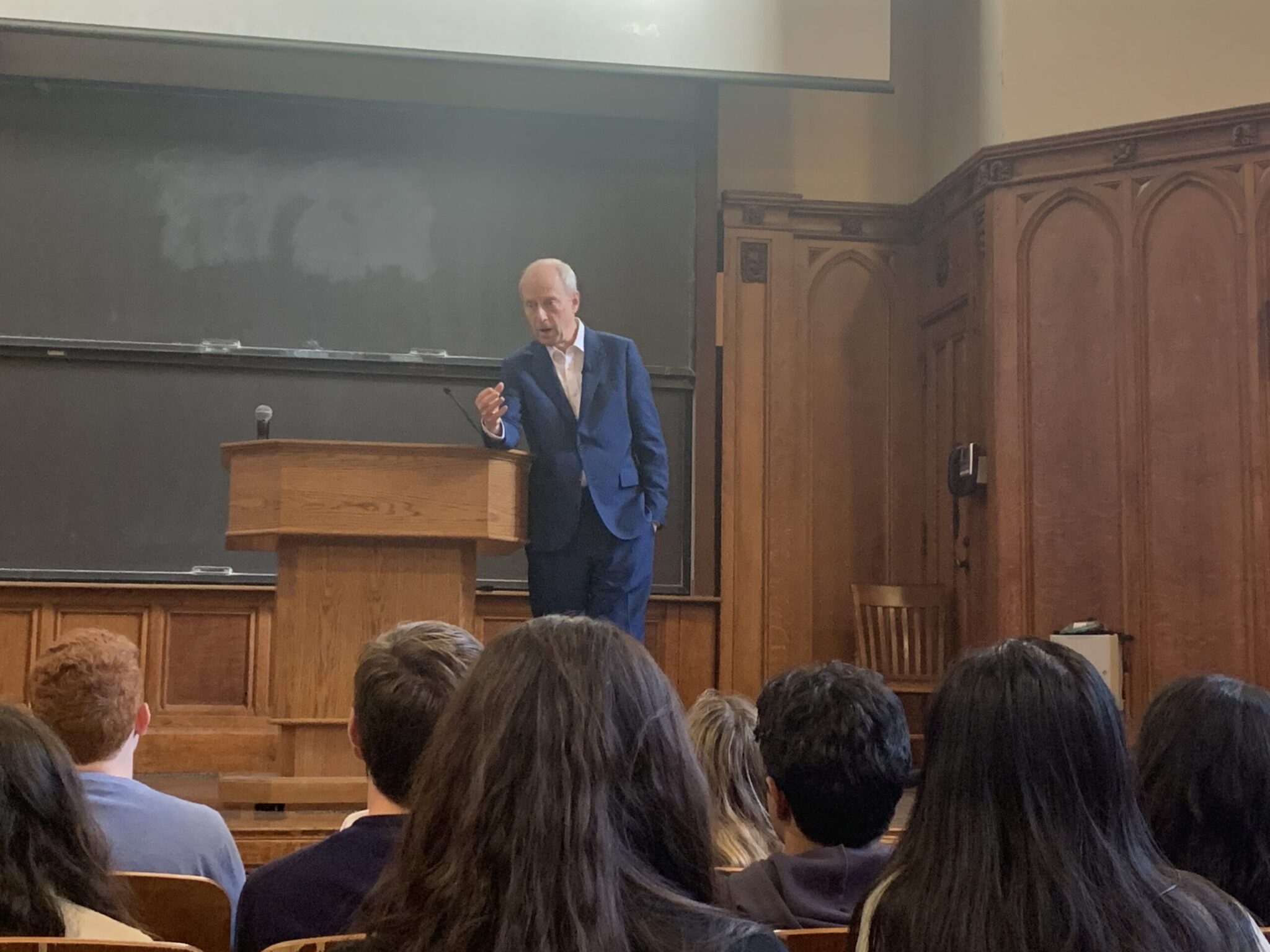Harvard professor Michael Sandel speaks on his book
The Allan Bloom Forum at Yale hosted professor Michael Sandel of Harvard to discuss “The Tyranny of Merit” on Oct. 12.

Ada Perlman, Contributing Photographer
On Oct. 12, the Allan Bloom Forum at Yale hosted professor Michael Sandel of Harvard to speak on his book “The Tyranny of Merit.”
The Allan Bloom Forum is affiliated with the Conservative Party of the Yale Political Union. According to their website, the forum holds that “ideas have consequences, and in this spirit, seeks to promote the public exploration of the ideas which have shaped American and Western culture.” According to one of the event organizers, the talk attracted over 250 students and faculty members.
“I found the lecture engaging and very reminiscent of Sandel’s ‘Justice,’ which I read a few years ago,” said attendee Niva Cohen ’27.
The forum is named after Yale professor Allan Bloom.
Sandel, who said he was a friend of Bloom, spoke fondly about him at the beginning of the lecture, mentioning how Bloom supported the idea of putting Sandel’s “Justice” class online to make it more accessible to a wider audience, and not just to his Harvard students.
Sandel opened up by discussing how the question of the tyranny of merit can be a paradoxical one. He said that there is a growing divide between “winners” and “losers” in meritocracy. He said that at Ivy League universities, “there are still more students from the top one percent than students from the bottom half of the country combined.”
Sandel claimed that meritocracy corrodes the “common good” and generates “hubris and humiliation.” He argued that meritocracy creates a system where the “winners” look down upon those less successful.
“I was really moved by how many attended the lecture,” Anne Lee ’26, who helped organize the event, said. “It was great to see such a wide range of people from all over Yale at the event.”
In his speech, Sandel claimed that the disconnect between “winners” and “losers” gets to the heart of one of his main research questions: what caused the populist backlash of voters in the United Kingdom and United States during Brexit and the Trump era? Many of the voters who voted for these political shifts, he argued, did so out of resentment of the “winners.”
Sandel claimed that elitism and resentment lay at the center of these issues, arguing that a “focus on honoring the dignity of work” was equally important to a four-year degree.
“We equate talent with moral desert, and don’t often think about the fact that everything about us is luck (even how hard we’re able to work),” Niva Cohen wrote to the News. “It’s important to puncture our utopian Yale bubble in which everyone is idolized for their reflective skills. Recenter humanity as a determinant for value, and deemphasize ability.”
Sandel argued that politicians on both sides of the aisle try to tout the “rhetoric of rising,” as he called it: the notion that “you too can go as far as your talents will take you.” Yet, Sandel said, the politicians who spread this rhetoric actually entrenched these inequalities further and neglected to alleviate these inequalities by changing economic policies.
“Obama used the phrase, ‘you can make it if you try’ 140 times in his speeches,” Sandel said.
Sandel told a story about Martin Luther King, Jr. who, he said, when meeting with a group of garbage collectors, mentioned that their jobs were as significant as a physician’s job.
If either neglected their jobs, Sandel said King told them, disease would spread in the community.
Sandel claimed that institutions of higher education also should play a role in creating change.
“Universities are arbiters of opportunities … we [they] should not concentrate these opportunities in a citadel and then make it a competition to get to this citadel,” Sandel stated.
In closing, Sandel argued that civic education can occur in places that are not prestigious university campuses and that higher education can be a public good not just for elites.
Sandel’s teachings are available online through websites like edX.







